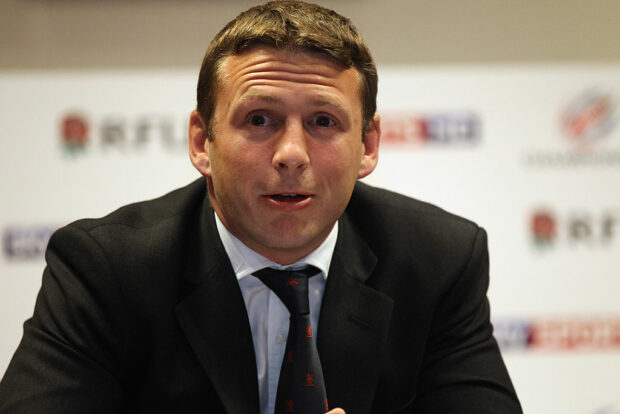THE only conclusion that can be drawn from the cynical slashing of Championship funding by Bill Sweeney, is that instead of being the governing body of the whole game in England, the RFU have turned into a rotten borough.
It has become the supine vassal of the Premiership clubs, doing their bidding irrespective of the damage it does to the rest of the game.
Twickenham have even supplied the Premiership with their chairman, Ian Ritchie, who went straight from one vast pay packet as RFU chief executive to a new post with the club cartel.
Ritchie and the Premiership's former chief executive, Mark McCafferty, who now works for CVC, the venture capitalists who acquired a 27 per cent stake in the Premiership last year, have long been supporters of ring-fencing.
This week a plan to deliver it came into plain sight with RFU hatchet man Sweeney attempting to chop down the Championship, the main tree that keeps the canopy of the RFU's own league structure alive.
As an act of administrative vandalism it takes some beating – especially as it has the potential to bring the tree crashing down on a Twickenham administration that seems to be totally at odds with its own mission statement “to encourage rugby, and its values, to flourish across England”.
In the RFU Strategic Plan 2017-21, entitled Game Of Our Lives, is a pledge to “Protect everything that makes rugby in England so special. Protecting community and professional clubs and players is of paramount importance in creating a successful game for generations of players to enjoy.”
Sweeney and RFU performance director Conor O'Shea should consider how that sits with the projected loss of over 300 jobs in the Championship if their projected cut in July from the current £530,000 per club annual funding to £288,000 stands.
It is laughable that Sweeney and O'Shea talk about the rationale for the cuts being Championship clubs failing to meet “a set of objectives and deliverables” while the RFU fail so blatantly to meet their own published objectives and commitments.
The claims made by Sweeney and O'Shea that Championship clubs are failing to deliver on multiple fronts – from being financially viable and having ambition to be promoted, to increased numbers of England-qualified players, coaches and referees – is also, for the most part, hogwash.

In fact, it bears all the hallmarks of a subterfuge aimed at delivering a franchise style ring-fenced Premiership while spouting weasel words about the need to preserve promotion and relegation.
While most Championship clubs are losing money, their losses are manageable, and the vast majority are certainly no worse in terms of boardroom governance than those in the Premiership, whose annual losses are £40m. The question this begs is how does the RFU justify bailing out that Premiership club debt while chopping Championship funding by between 40 and 50 percent?
On the subject of ambition, at least half of the clubs in the Championship are investing substantially in their futures.
Cornish Pirates are in the process of building a new stadium; Coventry are redeveloping their stadium; Nottingham have deals in place to play at Meadow Lane (Notts County); Doncaster and Ealing Trailfinders have made a goal of going up – and a more ambitious agenda is said to have taken root at Bedford.
At the last count all the Championship clubs were meeting the targets for 17 English-qualified players in each match day squad – more than can be said for many of their Premiership rivals.
For instance, O'Shea's old club, London Irish, went into Saturday's match against Harlequins, with just five England qualified players in their starting line-up. Perhaps Sweeney should examine if the RFU are getting value for the £228m eight-year deal they signed with the Premiership in 2016 before they start laying waste to the Championship.
Sweeney argues, against all the available evidence, that the Championship has not developed English coaches and referees. Wayne Barnes refereed in the Championship for a couple of seasons, and Matt Carley, Luke Pearce, Tom Foley and Karl Dickson were all doing Tier Two games before being promoted.
Coach-wise we have Rob Baxter (Exeter), Simon Amor (England), Alex Codling (England U20), Lee Blackett, Ian Costello (both Wasps), Matt Ferguson (Northampton), Glenn Delaney (London Irish/Scarlets), who learnt their trade in the Championship.

Sweeney has clearly not done enough homework before embarking on his slash and burn policy, and nothing illustrates it more clearly than his suggestion that the Championship has produced only one England player of note in Exeter's Harry Williams, who played for Jersey.
Jack Nowell and Luke Cowan-Dickie both learned their rugby at Cornish Pirates and the majority of the players in the England squad over the past decade have played for either a Championship or National League club during their development.
There was a great schism in this sport over a century ago, and the RFU should tread warily on the path that Sweeney, O'Shea and current chairman, Andrew Coslett, appear to be leading them down.
There is huge disenchantment with the governing body in not just the Championship, but also in the community/grassroots club game.
The RFU were forced into a climbdown over lower league reforms after a rebellion from Lancashire grass roots clubs two years ago, and now some Championship clubs are considering a breakaway.
An administrative split would not serve rugby's best interests, but if it brings the RFU back to their core business of being custodians for the game as a whole, it may be a necessary evil.
The rank-and-file clubs are the constituents of the RFU, and they are also part of a mutual co-operative society that owns Twickenham. Given that the ground is the cash cow that funds a significant part of the revenue paid by the RFU to the Premiership it means they have considerable leverage.
So far, the Championship clubs have called for a two-year moratorium on the cuts. They have a strong case given that the mid-term review of the RFU's £228m deal with the Premiership is due in June. If there are cuts to be made, surely they should be shared by the Premiership clubs?
It is unlikely the Premiership clubs will see it that way. That is why this gentlemanly Championship response is mistaken.
The Championship chairman Geoff Irvine is in danger of wielding a plastic knife rather than a broadsword in an arena in which the RFU's axemen, Sweeney and O'Shea, have already made it clear that they intend to wound the Championship so grievously that it bleeds out.
Now that the Armageddon scenario of no funding is staring them in the face, with their own union seeking to chop them down, the Championship clubs must take action.
A starting point would be to canvas the rank-and-file clubs with a view to holding an immediate SGM calling for a no-confidence vote in the current RFU administration.
The Championship clubs should also take advice on legal proceedings to challenge the RFU's financial arrangements with a Premiership cartel which has relied on restraint of trade protectionism and funding inequality to deny other clubs with professional ambitions the right to compete in English rugby's top league.
It is time for the Championship clubs, and the National League and community clubs, to stand their ground and demand an RFU that protects their interests.
NICK CAIN


























